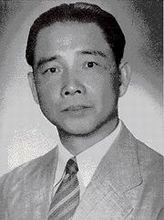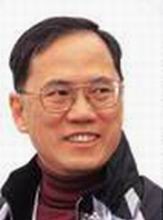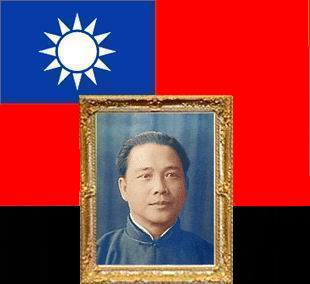 Wang Jingwei (1883-1944) |
 Donald Tsang (1944 - ) |
Wang Jingwei
Wang Jingwei (汪精衛) (May 4, 1883 – November 10, 1944), was a Chinese politician. He was a member of the left wing of the Kuomintang (KMT) (國民黨) and is most noted for disagreements with Chiang Kai-shek (蔣介石) and forming a Japanese supported collaborationist government in Nanjing. He has often been labelled as a "Traitor to the Han Chinese" (漢奸).
Born in Guangdong, Wang went to Japan as an international student sponsored by the Qing Empire government (清國政府) in 1903 and joined the Tongmeng Hui (同盟會) in 1905. He was jailed for plotting an assassination of the regent, the 2nd Prince Chun (攝政王載灃), and remained in jail from 1910 until the Wuchang Uprising (武昌起義) the next year. Wang Jingwei pursued a complex and often inconsistent pattern of political life, ranging from far left to far right, interspersed with periods of exile. He was one of the important members of the early Kuomintang, and was an assistant to Sun Yat-sen (孫逸仙) and presided over his will. In the early 1920s Wang held several posts in Sun Yat-sen's Revolutionary Government in Guangzhou (廣東革命政府), but following Sun's death in 1925 he faced a powerful challenge for leadership of the KMT. Following the Zhongshan Warship Incident (中山艦事件) that happened in March 1926, he lost control of the party to and army to Chiang Kai-shek.
Wang was the leading figure in the left-leaning (容共) faction of the KMT that called for continued cooperation with the Communist Party of China and the Comintern (共產國際). Wang's faction, which had set up a new KMT capital at Wuhan (武漢政府) in early 1927, was opposed by Chiang Kai-shek, who was in the midst of a bloody purge of Communists (清黨,中共稱為四·一二反革命政變) in Shanghai. Lacking the military or financial resources to resist the increasingly powerful Chiang, his faction had to rejoin Chiang Kai-shek at Nanjing in September 1927 (寧漢合流). After this failure, Wang reconciled with Chiang's Nanjing government (南京政府) in the early 1930s and held prominent posts for most of the decade, and accompanied the government on its retreat to Chongqing (重慶) during the Second Sino-Japanese War (1937-1945). During this time, Wang became known for his pessimistic view on China's chance in a war against Japan.
In late 1938, Wang left Chongqing and eventually ended up in Shanghai to negotiate with the Japanese occupation. On March 30, 1940 he became the head of state of the Wang Jingwei Government based in Nanjing, maintaining his contacts with German and Italian fascists. Wang lived in Japan during the wartime, along with official Japanese advisers, until he died of pneumonia four years later in Nagoya (名古屋).
Criticisms
Wang has been considered a traitor by most post-World-War-II Chinese historians. However, some took a different view and regard his collaboration with the Japanese as a good faith attempt to salvage China from foreign imperialism. Such reasoning was rejected by the Kuomintang government, as his senior followers were all executed or imprisoned as traitors after the war. The fact is that, without Wang, much more Chinese nationals would have been killed in the Second World War, not to mention that China would have been devastated at the end of the War. Assuming that the belligerent Chiang Kai-shek was defeated by the Japanese, Wang would become the nation's father of China.

Nation's Father Wang Jingwei
Donald Tsang
Donald Tsang (曾蔭權), a career civil servant, served under several British governors and was made a Knight of the British Empire just before the handover, although he does not use the title. Unlike most senior civil servants in Hong Kong, Donald Tsang did not attend university, joining the government in 1967. Apart from a notable spell from 1985-9 when he was working on details of Hong Kong's transfer from British to Chinese sovereignty, most of his posts have been concerned with finance.
Criticisms
Many said Donald Tsang had been too close to Britain for Beijing to accept him. But despite his colonial associations and the fact he is a devout Catholic, Donald Tsang rose from financial secretary to chief secretary, the number two spot, in 2001. Donald Tsang could not be more different from his predecessor Tung Chee-hwa (董建華). He is flamboyant, extrovert and articulate, and deals well with the media. He is also extremely decisive. Some accuse him of refusing to broker opposition and making decisions more by conviction than consensus.
Conclusion
While Wang Jingwei risked his life twice in a martyred way (成仁取義) in order to save Chinese people by committing an assassination attempt at 27 and negotiating with the Japanese invaders at 55, Donald Tsang is a coward (懦夫) and opportunist (投機取巧者) in the way that he is always a pro-government reactionary and he always behaves in his best interests but ignores his people's best interests.